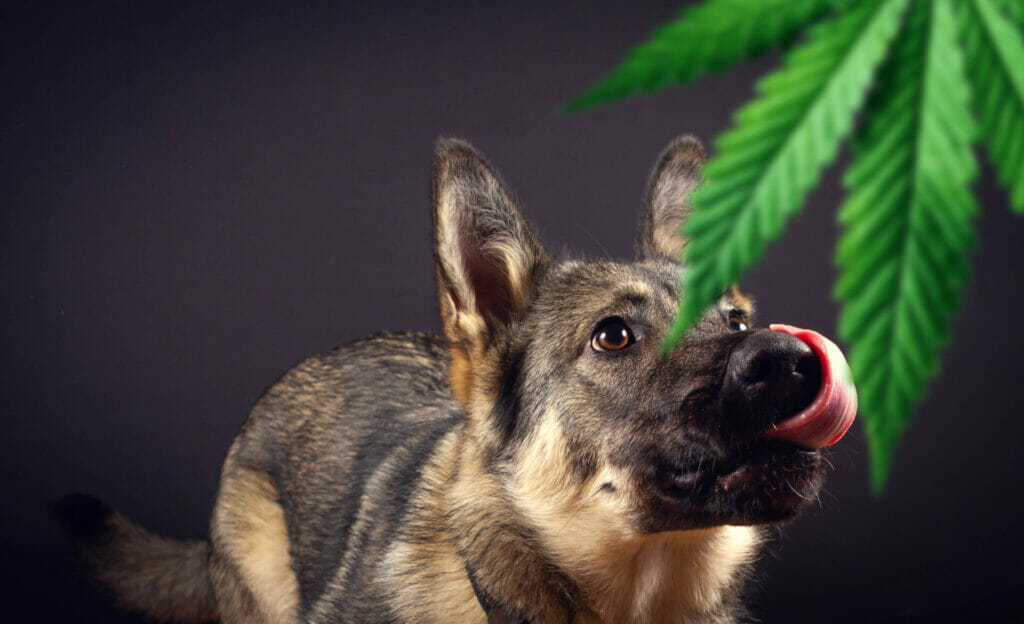My dog ate weed… Now what? Marijuana use has become increasingly popular in recent years and as a result there has been a rise in cases of dogs ingesting the drug. This is particularly concerning since marijuana can be toxic to dogs and can lead to a range of health problems.
The number of cases of marijuana intoxication in dogs has risen dramatically in recent decades. Small tracing of the drug seem to be scattered among the streets and in parks, especially in cities. Fortunately, it’s rarely fatal, but it can bring about some worrying symptoms. And you should always seek veterinary advice if you suspect your dog has ingested this drug.

What are the dangers of dogs ingesting marijuana, and what can you do to keep your dog safe and prevent it?
What Is In Marijuana?
The active ingredient in marijuana is delta-9-tetrahydrocannabinol (THC), responsible for its psychoactive effects. Marijuana comes from a plant called hemp. Its scientific name is Cannabis sativa. Marijuana plant refers to the dried leaves, flowers, stems, and seeds from the Cannabis sativa or Cannabis plant.
What are the dangers of dogs ingesting marijuana?
When dogs ingest it, THC binds to cannabinoid receptors in their brain and causes a range of clinical signs and symptoms. These can include lethargy, loss of coordination, vomiting, diarrhea, and even seizures. In severe cases, dogs can become comatose or even die.
However, your dog can also suffer poisoning from eating any part of the actual plant (including the leaves, seeds, stems, and flowers), from secondhand smoke inhalation, consuming hashish oil, or even from eating the feces of an individual that has ingested cannabis.
One of the reasons marijuana poses danger for dogs is that they more sensitive to THC than humans. While a small amount of marijuana may only cause mild symptoms in a human, the same amount can be highly toxic to a dog. In addition, dogs are more likely to ingest large amounts of marijuana at once. Essentially the volume can also increase the risk of toxicity. It has been recommended to induce vomiting if ingestion is suspected.
Symptoms of Marijuana Poisoning
- Acting Lethargic
- Dilated pupils
- Wobbling/Unsteady Walking
- Urinary incontinence
- Vomiting
- Tremors and shaking
- Agitation
- Respiratory irritation
Tetrahydrocannabinol (THC) is the potent psychoactive substance in marijuana and dogs have a much more severe reaction than humans. Symptoms are typically visible within 30 minutes to an hour after ingestion of the drug or sooner if inhaled. Other possible symptoms include vomiting, tremors and shaking, agitation, and some dogs can become comatose.
More than 95 percent of the veterinary medicine patients seen for marijuana toxicity are dogs, and almost all exposed animals will exhibit neurological signs. The most common clinical signs of ingested marijuana are stumbling, uncontrollable urine dribbling, drooling, low body temperature, low blood pressure, and an increased response to stimulation.
How Much Weed is Toxic For Dogs?
The minimum lethal oral dose for dogs for THC is more than 3 g/kg. Although the drug has a high margin of safety, deaths have been seen after ingesting food products containing the more concentrated medical-grade THC butter.
Treatment
Treatment for dogs who ingest marijuana is quite variable depending on the severity of the symptoms presented, and some dogs can be treated as outpatients at home, while others will require hospitalization for intravenous fluids and supportive care.
In severely affected animals, it is recommended to undergo intralipid therapy, an infusion of lipid (the fat used in IV fluids for nutrition support) to help bind the marijuana and allow it to be eliminated from the body faster. This depends on the dog’s body and size.
Regardless of how your dog’s marijuana ingestion occurs, you should always seek veterinary advice. Because the potency of marijuana is variable and a regulatory agency does not regulate the amount in edibles, it is tough to know exactly how much a dog has ingested. However, with proper treatment, dogs will usually recover fully within one to two days.




















